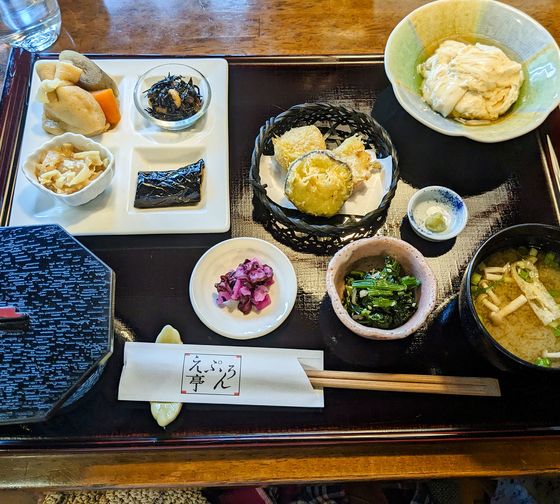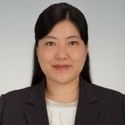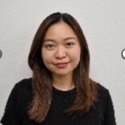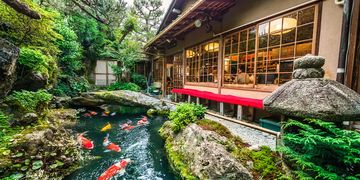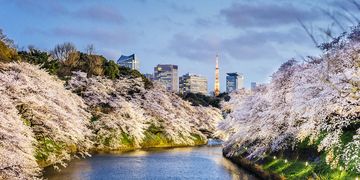
Engineering, Technology + Sciences
Unique Experiences
Immerse Yourself in Japanese Tradition
with a private tea ceremony and lessons in the art of ikebana, aka flower arranging
Explore Tokyo's Innovation Hub
called Akihabara and visit cutting-edge robotics labs and tech museums
Connect with Tokyo's Vibrant Startup Scene
through networking events with local entrepreneurs and innovators
Your Destination
Tokyo is Japan’s innovative, forward-thinking capital, renowned for its leadership in engineering, technology, and robotics. The city is a global hub for cutting-edge research, advanced manufacturing, and futuristic infrastructure, with pioneering projects like high-speed rail, artificial intelligence, and sustainable urban planning. With its vibrant cultural scene, historic temples, bustling streets, and world-class restaurants, Tokyo is the perfect place to study engineering, technology, and science abroad.
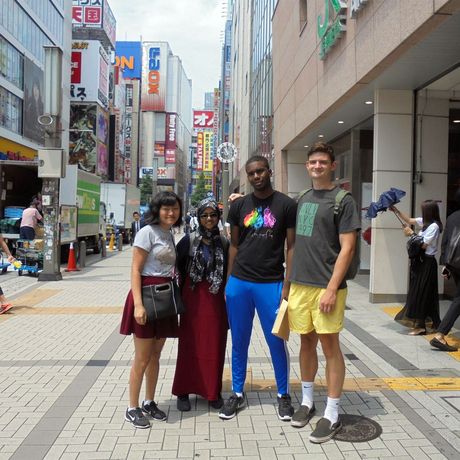
Program Highlights
- Academic Courses: Choose from CIEE courses and host institution courses that align with your academic major.
- Immersive Experiences: Participate in activities, excursions, study tours, and more that showcase your host city's culture and commitment to engineering, technology, and science.
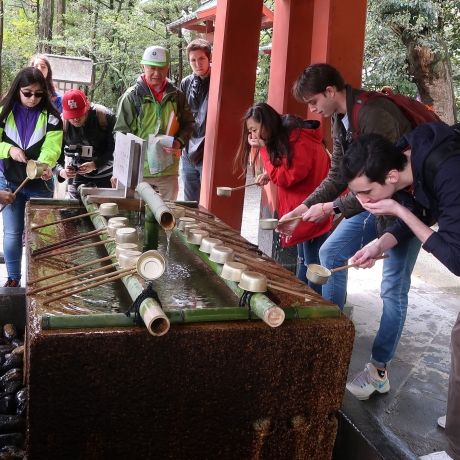
Excursions & Activities
CIEE’s excursions and cultural activities in Tokyo will open doors for you to explore Japan's rich diversity, language, culture, history, and timeless beauty in ways that will enhance your time abroad.
Samples of past excursions and activities:
- Discover the historic and cultural side of Tokyo with guided visits to iconic landmarks such as the Meiji Shrine, Asakusa’s Senso-ji Temple, and the bustling Tsukiji Outer Market
- Visit the beautiful city of Kamakura, known for its Great Buddha and serene temples, just a short train ride from Tokyo
- Participate in carefully curated STEM-focused activities, such as visits to tech expos, research facilities, and guest lectures by local industry leaders
Please note: Activities are based on past programs and subject to change at CIEE's discretion to adapt to local circumstances and participant feedback. Our goal when arranging activities is always to enhance your experience.
Program Blogs

EAT, DRINK, EXPLORE: TOKYO
BEST FOOD TO EAT IN TOKYO Since the 17th century, soba (buckwheat) noodles have been a staple in the Japanese diet. These tasty noodles are as thick as spaghetti and... keep reading
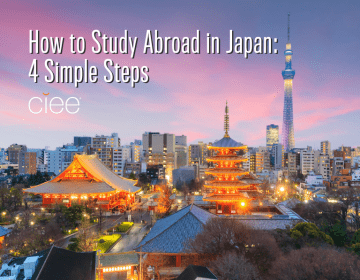
How to Study Abroad in Japan: 4 Simple Steps
Japan is an extraordinary country – one of the oldest in the world – and it will surprise and delight you at every turn. If you choose a Japan study... keep reading

Top 10 Japanese Slang Words & Phrases You Must Know
Textbook Japanese is great and all, but if you really want to impress the locals, you need to know Japanese slang terms. These aren’t the phrases you’ll learn in class... keep reading
Housing & Meals
Housing
CIEE Tokyo provides student dormitory housing to ensure you're comfortable in your home away from home. Each dorm offers a safe and supportive living environment with convenient access to shopping, supermarkets, restaurants, and public transportation. We aim to make your stay in Tokyo as smooth and enjoyable as possible.
Standard Housing: Includes a single occupancy room in an international residence hall within a 70-minute commute to CIEE Center.
- Oberlin Student Dormitories: The student dormitories are off campus university housing which provides single rooms with kitchenettes and private bathrooms. Students have access to study rooms, meeting rooms, a TV area, and laundry at the dorms. Dorms are conveniently located near public transportation routes and a free shuttle bus takes passengers to the J.F. Oberlin main campus in 5-8 minutes.
- If the Oberlin student dormitories are fully booked, CIEE also provides alternative accommodation at a private student dormitory which is located around 30 minutes by public transportation to the campus.
A note: The default criterion to assign housing is first-come, first-served; however, other factors may also be considered. If we cannot accommodate your first housing choice, we'll let you know before you arrive. Non-standard housing options require an additional fee that can be found in the Dates and Fees program.
Meals
Residence Hall: Students have shared kitchen facilities to prepare meals or purchase food and drinks at local grocery stores.
Academics
CIEE Tokyo: Study in Chiyoda City, a special ward in the heart of Tokyo. CIEE Tokyo features a student lounge, a library, a student life office, and an academic advising office.
J.F. Oberlin University: J.F. Oberlin University’s Machida Campus offers an academically rigorous and immersive experience tailored for students pursuing engineering, technology, or science fields. Designed to enhance both academic and professional skills, this program provides a unique opportunity to study STEM in the context of Japan’s dynamic and innovative landscape. Classes at J.F. Oberlin University are delivered by experienced faculty and feature modern facilities equipped with state-of-the-art technology. Students also benefit from small class sizes and interactive learning environments that encourage collaboration and active participation. For those seeking to broaden their practical skills, credit-bearing internships in the STEM fields are available, offering hands-on experience and exposure to Japan’s cutting-edge industries.
Course Information
History, Philosophy, Religion
Social Sciences
Visual and Performing Arts
Business, Economics, Management, and Marketing
Computer and Information Sciences and Support Services
Engineering and Engineering Technologies
Natural Resources, Conservation, and the Environment
Psychology
Academic Projects
History, Philosophy, Religion
Social Sciences
Visual and Performing Arts
Business, Economics, Management, and Marketing
Computer and Information Sciences and Support Services
Engineering and Engineering Technologies
Natural Resources, Conservation, and the Environment
Psychology
Academic Projects
History, Philosophy, Religion
Social Sciences
Visual and Performing Arts
Business, Economics, Management, and Marketing
Computer and Information Sciences and Support Services
Engineering and Engineering Technologies
Natural Resources, Conservation, and the Environment
Psychology
J.F. Oberlin University
Not all courses listed are offered every semester, and some courses have prerequisites. The final list of courses is made available during the course enrollment process.
J.F. Oberlin University at a glance
The following list of courses constitutes a representative sample of course offerings through the university and is subject to change. In some cases, prior background knowledge may be required to enroll in a class.
- Culture & Identity
- Fieldwork in Japan
- Approaches to Japan
- Premodern History
- Japanese Aesthetics
- Jp Theatrical Arts
- Works of A. Kurosawa
- Smartphone Filmmaking
- Multiculturalism
- Issues and Debates
- Modern Cultural History
- US-JP Exchanges
- Japanese Cinema
- Multiculturalism
- Gender Representation
In cases where courses require a certain level of Japanese proficiency, students may be unable to take them if they do not meet that level. Students may also apply for the Chinese language courses, if qualified.
CIEE courses will be offered at Oberlin Machida campus. These courses are only offered to CIEE students.
Note: This course listing is for informational purposes only and does not constitute a contract between CIEE and any applicant, student, institution, or other party. The courses, as described, may be subject to change as a result of ongoing curricular revisions, assignment of lecturers and teaching staff, and program development. Courses may be canceled due to insufficient enrollment.
"(GI)" denotes courses that originated at CIEE's Global Institutes and that are offered at multiple CIEE sites.
Scholarships & Grants
CIEE offers scholarships and grants annually to help students like you make your study abroad dream a reality.
Students who apply to this program are eligible for the following scholarships and grants:
- Wollitzer Merit Scholarships in Area or Comparative Studies
- Ping Scholarships for Academic Excellence
- Global Access Initiative (GAIN) Grants
- McDermott Health Sciences, Nursing, and Public Health Merit Scholarships
- CIEE Gilman Go Global Grant
- Trailblazer Grant
To be considered, submit the CIEE Scholarships & Grants application within your CIEE program application.
Dates & Fees
You get more for every dollar when you study abroad with CIEE, because our high-quality programs include everything from excursions to insurance. There are no hidden charges, and no disappointing surprises when you arrive.
Program |
Application Due |
Start Date |
End Date |
Fees & Housing |
|---|---|---|---|---|
| Program Spring 2026 18 weeks | Application Due Deadline Passed | Start Date | End Date | Fees & Housing $19,950 |
| Program Fall 2026 17 weeks | Start Date * | End Date * | Fees & Housing $19,950 | |
| Program Academic year 2026-2027 48 weeks | Start Date * | End Date * | ||
| Program Spring 2027 18 weeks | Start Date * | End Date * |
*Dates for this program are provided as tentative dates. Please consult with your study abroad advisor to confirm dates before purchasing your flights.
To help you budget, keep in mind that students are responsible for the cost of international airfare, local transportation, books and supplies, visas, and personal expenses. In addition, your college or university may charge additional fees for study abroad, or may require you to receive a transcript via CIEE's School of Record, which carries an additional fee of $500.
Program Fees
CIEE offers the most student support of any provider in its program fee, including an airport greeting, full-time leadership and support, orientation, cultural activities, local excursions, pre-departure advising, and CIEE iNext travel protection with benefits.
| Participation Confirmation | $300 * |
| Educational Costs | $14,956 ** |
| Housing | $4,500 *** |
| Insurance | $194 |
| Visa Fees | $0 |
| Total Fees | $19,950 |
Optional Housing
CIEE accommodation options are detailed in the Housing section. Based on availability, Select or Select Plus Housing can be chosen during the application process for an additional fee. Housing is assigned on a first-come, first-served basis; however, other factors may also be considered.
| Select Housing Fee | $2,700 |
| Select Plus Housing Fee | $3,150 |
Financial Aid
CIEE offers the most grants and scholarships of any study abroad organization, including $8 million/year in travel grants, merit-based scholarships, institutional grants, and Gilman Go Global Grants.
Estimated Costs
Students are responsible and manage costs related to travel, meals, books, and personal expenses. Below are estimates for consideration.
| Meals not included in program fee | $607 † |
| International Airfare | $1,700 †† |
| Local Transportation | $105 |
| Books & Supplies | $200 |
| Visa Fees | $22 ††† |
| Personal expenses | $292 †††† |
| Other | $100 ††††† |
| Total Costs | $3,026 |
*non-refundable fee
**direct cost of education charged uniformly to all students
***Housing fees listed are for financial aid purposes only and should not be considered a basis for calculation of refunds.
†For students in homestays, families provide 2 meals a day. For students in apartments, you should budget approx. $428 per month for groceries if you plan on making your own meals, and more if you plan on eating out regularly.
††round-trip based on U.S. East Coast departure
†††visa application fee
††††$100 emergency fund + cell phone expense + toiletries (Sim requires one-time fee of $25)
†††††Japanese National Health Insurance
Program Fees
CIEE offers the most student support of any provider in its program fee, including an airport greeting, full-time leadership and support, orientation, cultural activities, local excursions, pre-departure advising, and CIEE iNext travel protection with benefits.
| Participation Confirmation | $300 * |
| Educational Costs | $14,956 ** |
| Housing | $4,500 *** |
| Insurance | $194 |
| Visa Fees | $0 |
| Total Fees | $19,950 |
Financial Aid
CIEE offers the most grants and scholarships of any study abroad organization, including $8 million/year in travel grants, merit-based scholarships, institutional grants, and Gilman Go Global Grants.
Estimated Costs
Students are responsible and manage costs related to travel, meals, books, and personal expenses. Below are estimates for consideration.
| Meals not included in program fee | $607 † |
| International Airfare | $1,700 †† |
| Local Transportation | $400 |
| Books & Supplies | $200 |
| Visa Fees | $22 ††† |
| Personal expenses | $292 †††† |
| Other | $100 ††††† |
| Total Costs | $3,321 |
*non-refundable fee
**Direct cost of education charged uniformly to all students
***Housing fees listed are for financial aid purposes only and should not be considered a basis for calculation of refunds.
†The listed cost is for students in homestays. For students in homestays, families provide 2 meals a day. For students in apartments, you should budget approx. $428 per month for groceries if you plan on making your own meals, and more if you plan on eating out regularly.
††round-trip based on U.S. East Coast departure
†††visa application fee
††††$100 emergency fund + cell phone expense + toiletries (Sim requires one-time fee of $25)
†††††Japanese National Health Insurance
Program Fees
CIEE offers the most student support of any provider in its program fee, including an airport greeting, full-time leadership and support, orientation, cultural activities, local excursions, pre-departure advising, and CIEE iNext travel protection with benefits.
Financial Aid
CIEE offers the most grants and scholarships of any study abroad organization, including $8 million/year in travel grants, merit-based scholarships, institutional grants, and Gilman Go Global Grants.
Estimated Costs
Students are responsible and manage costs related to travel, meals, books, and personal expenses. Below are estimates for consideration.
Program Fees
CIEE offers the most student support of any provider in its program fee, including an airport greeting, full-time leadership and support, orientation, cultural activities, local excursions, pre-departure advising, and CIEE iNext travel protection with benefits.
Financial Aid
CIEE offers the most grants and scholarships of any study abroad organization, including $8 million/year in travel grants, merit-based scholarships, institutional grants, and Gilman Go Global Grants.
Estimated Costs
Students are responsible and manage costs related to travel, meals, books, and personal expenses. Below are estimates for consideration.
What's Included
Tuition
Housing
Pre-departure Advising
Advising before you depart to set goals and answer questions
Optional on-site airport meet-and-greet
Orientation
Introduction to your program plus practical information about living in your host city
On-site Staff
Full-time program leadership and support in your city
Cultural and/or Co-curricular Activities
Excursions and/or Study Tours
Travel Protection
CIEE iNext travel protection
24/7 emergency on-site support
Our Staff
Brendan Delahunty
Center Director
Brendan is a long-time resident of Japan, originally hailing from Sydney, Australia
Saya Nishina
Director of Operations
Saya gained extensive experience in the language education industry, working in various departments including sales/marketing, human resources, academic affairs, new business development, and international operations in Japan for more than 20 years.
Rumi Mizusako
College Program Coordinator
Rumi is passionate about encouraging others to explore beyond what they have always known and to engage in different cultures and values.
Get Started
1
2
Connect With Your Campus Study Abroad Office
Share your plans and confirm you're on track to meet all required steps to go abroad.
3
Contact Us
Send us an email if you still have questions or need information about applying to this program.

